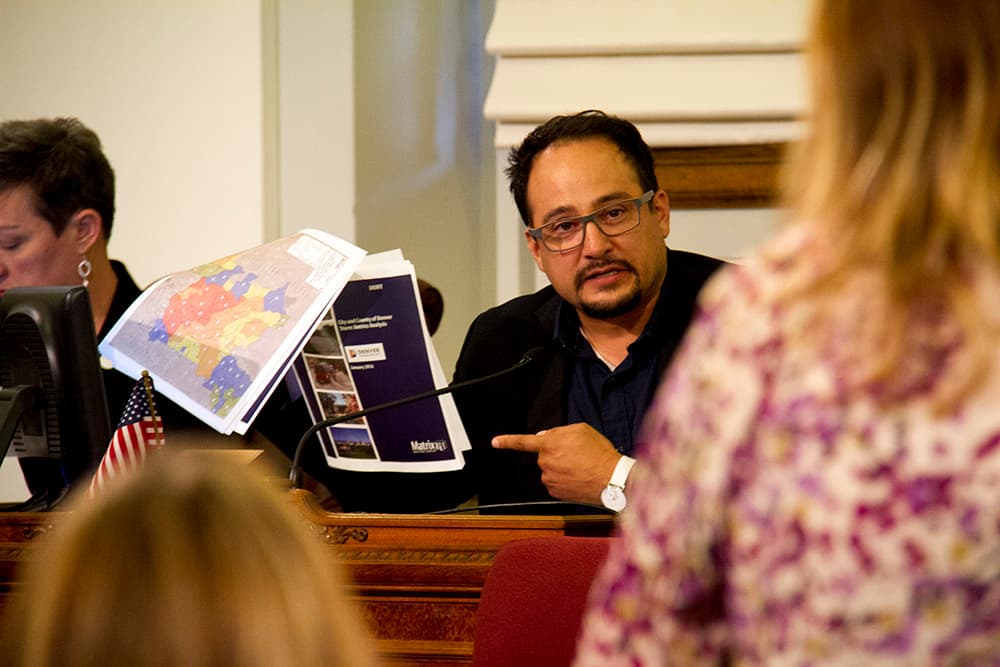
According to a motion filed earlier this week, Denver wants to use the concept of deliberative privilege to block Councilman Rafael Espinoza from joining a lawsuit against the city over its plans to use City Park Golf Course for stormwater detention. That is, because the councilman was part of internal discussions at the city about the project, he shouldn't be allowed to become a plaintiff in the lawsuit.
Espinoza said that to him, it's "very telling that they're pushing back" on him joining the lawsuit.
"The fact that they're fighting this should raise concerns with the public," he said.
"Deliberative privilege" is a legal concept that prevents the disclosure of internal discussions so that everyone involved can speak freely. It's not unusual, for example, for a city to cite deliberative privilege in withholding emails between staff members in response to a public records request.
A caveat: This version of the city's position comes from a motion filed by the plaintiff's attorney, Aaron Goldhamer. Goldhamer has eight plaintiffs he wants to add to the lawsuit, and according to his motion, he talked to the City Attorney's Office and found the city only objects to Espinoza. The city will file its own motion soon enough that lays out its argument in more detail. A Denver spokeswoman did not respond to a request for comment, but other outlets reported an official "no comment" on ongoing litigation, which is pretty normal.
This lawsuit was originally brought by J.D. MacFarlane, a Park Hill resident and former state attorney general. The lawsuit contends the city is violating its own charter by using the golf course for stormwater detention. The charter says that park land can only be used for park purposes and that park land can only be disposed of with a vote of the people.
The city contends the golf course will still be a golf course, so it's using park land for park purposes and not disposing of it. Lots of cities and counties around the country use golf courses and other parks for stormwater detention.
The plan to use the golf course for stormwater detention is part of the massive Platte to Park Hill flood control project. (Andy wrote more about that, and its potential connections to the I-70 project, here.)
In his motion, Goldhamer argues the city can't use deliberative privilege to keep Espinoza out of the lawsuit. This privilege, which is not absolute, applies within the executive branch, but the executive branch (the Mayor's Office) can't assert a deliberative privilege over the legislative branch (City Council).
... it does not appear that the deliberative (or “executive”) privilege applies in any meaningful way to communications between the executive and legislative branches. Defendants are members of the former while Mr. Espinoza, in his official capacity, is a member of the latter. Defendants may have communicated with the legislative branch to convince it to fall in line with the at-issue project and an accompanying stormwater fee rate increase paid by the public, but those communications would not reflect Defendants’ “executive” or “agency” deliberation. Rather, those communications would simply be evidence of Defendants’ waiver of any privilege to obtain the consent of City Council — an independent body that conducts its own often-fractious deliberations in public, rather than undertaking unitary executive decision-making.
Espinoza said he did not take lightly the decision to ask to join the lawsuit.
He voted no last year on the stormwater fee increases that will pay for this project. He argued then that this project is primarily about protecting the lowered I-70 expansion from inundation in floods and diverts money that could otherwise go to drainage projects around the city.
However, there is no direct impact on District 1 in northeast Denver.
Espinoza said he reconsidered after attending a pre-trial hearing in which the city argued to exclude any arguments about I-70 from the trial.
"I took exception to that," he said. "I want my city to be transparent."
He also is concerned about the precedent being set. There are parks and golf courses near I-70 in his district, and if or when CDOT seeks to widen the western portion of the highway, they too could be used for detention.
"If I-70 didn't go through my district and if we didn't have (drainage) needs going through district, I wouldn't be in this fight," he said.
As for the idea of deliberative privilege, Espinoza said any information shared with him by Public Works, Parks and Rec or the mayor's office is public information, and he does not have access to any privileged information.
Goldhamer said he's not adding Espinoza to the lawsuit to get in some sort of jab at the city.
"He has intensely studied the proposal and is familiar with all the details," he said. "Having him as a plaintiff really helps in telling the story about why this is a non-park use. It really assists in the vindication of the at-issue rights."
Right now, the case -- with or without Espinoza as a plaintiff -- is set for Aug. 21 jury trial.












